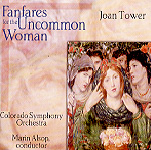It should be enough to say that Joan Tower is one of the world’s most successful, busiest, and respected composers–but the producers of this disc, and the liner note commentator in particular, just can’t seem to get past the need to also drive home the fact that she’s a woman with an agenda. Of course, women classical composers are rare, even after decades of consciousness-raising and efforts to eliminate historical attitudes and barriers; but most listeners and performers today aren’t so concerned about the sex of a work’s creator, and few will argue that women should not be included in all areas of the classical music world. Neither will they argue with Tower’s own belief that “unless it has lyrics, music is genderless.” So what are we to make of Tower’s five Fanfares for the Uncommon Woman–a direct reference to and point of departure from Aaron Copland’s familiar Fanfare for the Common Man? The first of them is scored identically to Copland’s piece, and even briefly quotes from it. Tower aptly describes it as a tribute to “women who take risks and are adventurous”; the liner-note commentator suggests that it’s “a feminist answer to Copland.” And just what male-centric point was Copland making in his Fanfare, which unquestionably is meant to include all humans? I suggest that you take Tower’s word for it, skip the irrelevant references to the “delicious irony” of brass sections of orchestras being “the last stronghold against women,” and just enjoy these ardent, artful, often bold, wonderfully varied, always involving pieces. Tower’s voice, like that of her “main musical idol” Beethoven, is strong and free and unafraid; it communicates using assured thematic strokes and well-chosen combinations of instruments–and it doesn’t linger too long in making its points. The festive and dynamic fanfares are accompanied here by two significant and substantial orchestral works that demonstrate the breadth of Tower’s musical individualism. The Colorado Symphony plays with a rich, vibrant tone and seemingly limitless energy. Tower herself may be a feminist–a point the liner notes make abundantly clear–but her music truly is “genderless”, welcoming all who will listen.
































